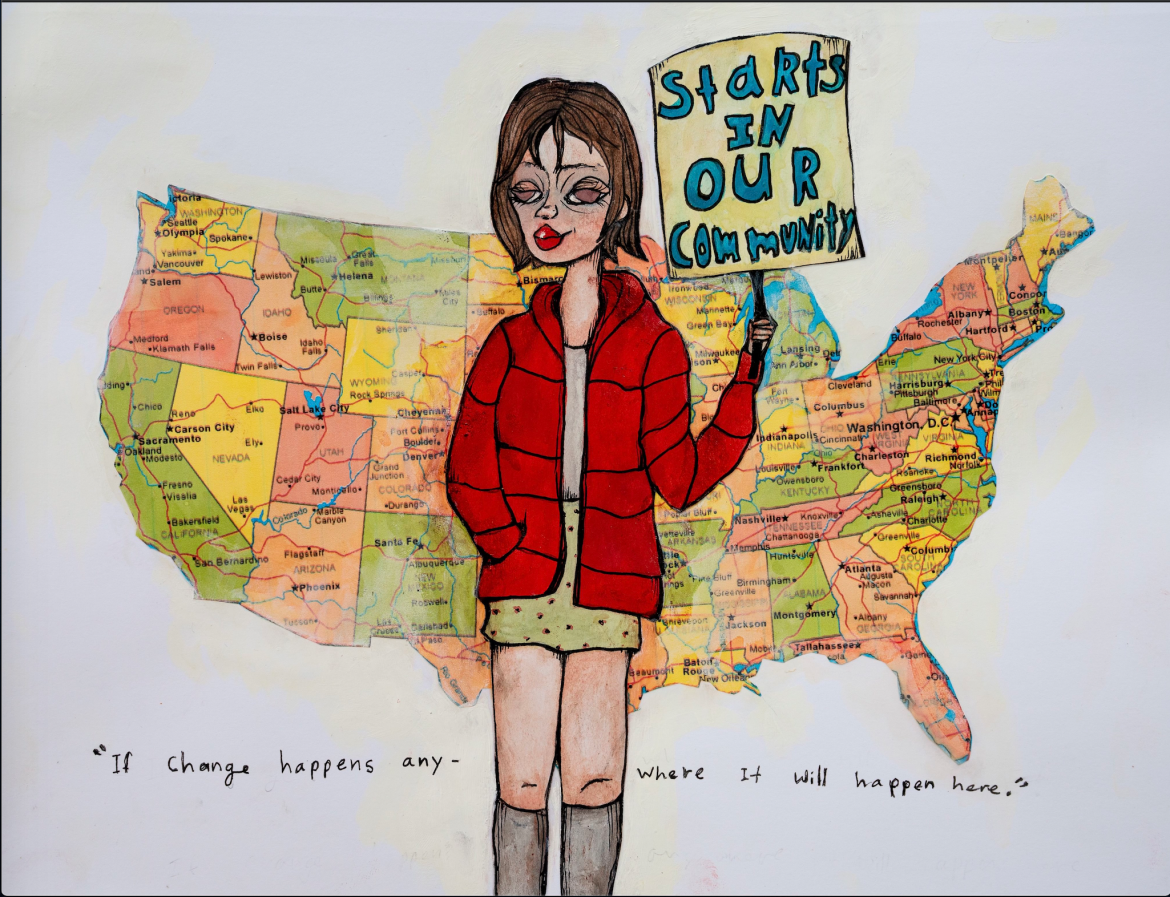An illustration of Co-Editor-in-Chief Naomi Hendershot stands in front of a U.S. map holding up a sign for change. Hendershot was deeply impacted by an interview she conducted during her coverage of a 2019 Board of Education controversy. Illustration by Frances Thrasher
As a student journalist, I live and breathe the idea of serving my community through my reporting and writing. Through my work, I am exposed to and informed of the many social injustices that face the Athens-Clarke County community, such as racial disparities, inequity of income and educational privilege.
It was amidst the Clarke County Board of Education controversy of the 2019-20 school year that the deeply rooted systematic racial issues that affect our school district were truly revealed to me in their entirety. Because of this, I developed ambitions to seek drastic systematic reform of those standing institutions, yet ambitions of that nature never seemed to make lasting impacts.
During this time, I covered one particular BOE meeting in the fall of 2019. The meeting held palpable tensions from those in attendance because this was the meeting that would determine the fate of former Clarke County School District Superintendent Dr. Demond Means, and potentially begin to resolve the long-standing conflict over how to address the racial achievement gap in the district.
Following my journalistic responsibilities, I scanned the crowd in search of a potential interviewee. As I walked along the aisles of chairs, CCSD community member Ms. Ruby Worthy, wife of district six BOE member Charles Worthy, caught my attention with her evident eagerness to speak on the issue of that night.
We discussed her thoughts on the meeting, her experiences, and what she witnessed as an older-generation Black woman in Athens. Despite what one would consider constant disappointments of racial injustices continuing in our hometown, she continued to have hope.
Before I concluded the interview and stopped my voice memo, she placed her hand on my wrist and left me with her final thoughts, saying, “If change is going to happen anywhere, it’s going to be here.”
Her words shook me. It was then I was confronted with a profound revelation, that change begins in our communities, the places we call home. One cannot change the course of long-standing unjust institutions in one motion. It happens piece by piece, in counties, towns, and city communities that make up our nation.
Athens-Clarke County, just as many other communities across the nation, is faced with adversity that 2020 had presented. While new challenges have been brought to the table, in retrospect, the pandemic has done nothing but intensified the pre-existing issues, like food insecurity, homelessness and the academic achievement gap.
We can’t effectively progress unless we take a step back and simplify initiatives in the communities in which we reside. From things like, voting in local elections and volunteer work to bigger things such as starting non-profit organizations that focus on helping impoverished communities, all contribute to the greater purpose of reforming unjust institutions.
As I’ve gone through the motions of this year, I think back to the words Ms. Worthy imparted to me. I’m reminded that change comes with time and that change happens when we recognize the
potential for it in the places we call home, because, “If the change is going to happen anywhere, it’s going to be here.”
